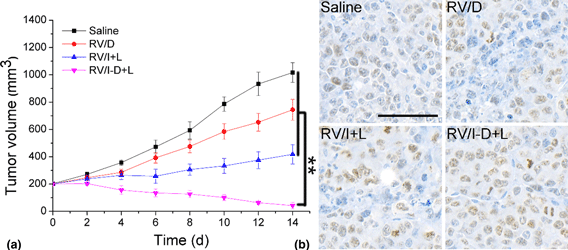Crossref Citations
This article has been cited by the following publications. This list is generated based on data provided by
Crossref.
Wang, Xiaoyou
Li, Chong
Wang, Yiguang
Chen, Huabing
Zhang, Xinxin
Luo, Cong
Zhou, Wenhu
Li, Lili
Teng, Lesheng
Yu, Haijun
and
Wang, Jiancheng
2022.
Smart drug delivery systems for precise cancer therapy.
Acta Pharmaceutica Sinica B,
Vol. 12,
Issue. 11,
p.
4098.
Zheng, Bing-De
and
Xiao, Mei-tian
2022.
Red blood cell membrane nanoparticles for tumor phototherapy.
Colloids and Surfaces B: Biointerfaces,
Vol. 220,
Issue. ,
p.
112895.
Zhang, Endong
Phan, Philana
Algarni, Hanan Ahmed
and
Zhao, Zongmin
2022.
Red Blood Cell Inspired Strategies for Drug Delivery: Emerging Concepts and New Advances.
Pharmaceutical Research,
Vol. 39,
Issue. 11,
p.
2673.
Alimardani, Vahid
Rahiminezhad, Zahra
DehghanKhold, Mahvash
Farahavar, Ghazal
Jafari, Mahboobeh
Abedi, Mehdi
Moradi, Leila
Niroumand, Uranous
Ashfaq, Mohammad
Abolmaali, Samira Sadat
and
Yousefi, Gholamhossein
2023.
Nanotechnology-based cell-mediated delivery systems for cancer therapy and diagnosis.
Drug Delivery and Translational Research,
Vol. 13,
Issue. 1,
p.
189.
Hu, Ruimin
Lan, Jin
Zhang, Dinglin
and
Shen, Wenhao
2024.
Nanotherapeutics for prostate cancer treatment: A comprehensive review.
Biomaterials,
Vol. 305,
Issue. ,
p.
122469.
Xie, Yuting
Yang, Ze
Shen, Hang
Chen, Jingyi
Weitz, David A.
Chen, Dong
Sheng, Jianpeng
and
Liang, Tingbo
2025.
Interfacial Engineering of Biocompatible Nanocapsules for Near‐Infrared‐Triggered Drug Release and Photothermal Therapy.
Advanced Science,
Vol. 12,
Issue. 2,
Li, Juan
Liu, Yunyi
and
Hu, Xiaoxiao
2025.
Drug Delivery to Tumors.
p.
211.
Fialho, Márcia Célia Pacheco
de Oliveira, Maria Alice
Machado, Marina Guimarães Carvalho
Lacerda, Carlos Marchiorio
and
Mosqueira, Vanessa Carla Furtado
2025.
IR780-Based Nanotheranostics and In Vivo Effects: A Review.
Journal of Nanotheranostics,
Vol. 6,
Issue. 1,
p.
8.
